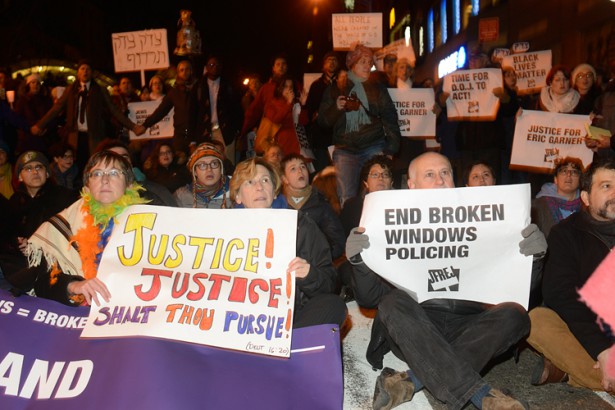
Thousands of people flooded the streets of cities across the country last night to protest a grand jury’s decision not to indict the New York City police officer who killed Eric Garner. While 10,000 protesters marched in lower Manhattan — shutting down the Brooklyn Bridge, the Manhattan Bridge, the Holland Tunnel, and the West Side Highway, leading to over 200 arrests — a smaller action took place uptown. Twenty-seven Jewish activists, including four rabbis, were arrested on Manhattan’s Upper West Side while engaging in nonviolent civil disobedience. The activists, surrounded by several hundred demonstrators, sat down in the intersection of Broadway and 96th Street and chanted — both political slogans and Jewish prayers — until they were carted away in police vans.
The action was organized by Jews for Racial and Economic Justice, or JFREJ, and began with 250 people marching from B’nai Jeshurun synagogue on 88th Street. The demonstration was organized as part of the #ThisStopsToday platform, whose demands include accountability for officers involved in Eric Garner’s death, an end to “broken windows” policing, and passage of the Right to Know Act. The latter would require police to identify themselves during altercations and to inform individuals of their right to refuse unwarranted searches.
Refrains of #blacklivesmatter and “justice for Eric Garner and Mike Brown” were present throughout last night’s march.
“I’m really proud to have been with other Jews making a statement that black lives matter,” said Rabbi Sharon Kleinbaum upon her release from jail this morning. “Justice is at the heart of my Judaism.”
Specifically, Jewish elements of dissidence and views of current events seen through the lens of Judaism were particularly present last night. Several signs included quotes from scripture, such as “My brother’s blood cries out to me from the ground” and “Justice justice you shall pursue.” One particularly poignant sign juxtaposed Eric Garner’s repeated cry of “I can’t breathe” with a passage from the Book of Job: “Remember, my life is but a breath.”
The crowd swelled to over 400 when activists took Broadway, as onlookers joined in on the chants. Demonstrators stood on the sidewalk and in the street behind the over two dozen Jewish activists who sat down on Broadway, chanting the Mourner’s Kaddish, which is traditionally part of Jewish mourning rituals.
“After the grand jury decision not to indict Officer Daniel Pantaleo, what we felt was mourning,” said Sara Gold, an organizer with JFREJ. “We were mourning the death of Eric Garner, the pain his family is feeling, the brokenness of this system, and the brokenness of this world. It felt like the right moment to say the traditional mourning prayer, the Mourning Kaddish.”
“It was really powerful to be sitting in the street and saying Kaddish,” concurred Cynthia Greenberg, who is the president of Kolot Chayeinu in Brooklyn and was arrested last night. “It felt like an honor and an obligation.”
Another Jewish mourning tradition is for the bereaved family members to sit shiva in their home. Demonstrators last night transformed the activist tactic of a sit-in into something infused with profound religious and poetic meaning.
“We were sitting shiva on the Upper West Side mourning these losses in the community,” said Gold. “And it was a powerful, powerful moment.”
After holding the intersection for half an hour, the NYPD moved in to zip-tie and arrest demonstrators. The arrests took place peacefully and orderly. Police were careful to arrest only those engaging in civil disobedience — inadvertently spotlighting the difference between how white and black people breaking the law in New York City are treated.
“A lot of our folks who got arrested said they really felt our privilege as white people when we were being processed through the system,” noted Gold.
The decision for JFREJ to organize an action on the Upper West Side happened almost by accident. The group is part of the New York City coalition called Communities United for Police Reform, or CPR, which is a play on the NYPD’s own CPR acronym: Courtesy, Professionalism, Respect. According to Gold, CPR is lead by organizations of directly-affected populations, which allied groups such as JFREJ take their cues from.
JFREJ was involved in longstanding planning for the major action in Foley Square last night, which the coalition had decided would take place the day after the grand jury decision even before that date was known. When organizers learned that the action would fall on last night, it conflicted with JFREJ’s largest annual event, the Rabbi Marshall T. Meyer Risk Taker Awards ceremony. So they regrouped and decided on a separate action that was still a part of #ThisStopsToday.
“We created an action that would specifically be for Jewish New York to come together to take and occupy a part of the Upper West Side,” Gold explained. “It’s a place that wasn’t expecting it and is not subject to the police violence that plagues other communities in our city. It felt important to make our presence felt in the heart of Jewish New York.”
Greenberg said the action made her “really proud of the Jewish community,” and that standing up to take action against racism and police violence is the “responsibility of all New Yorkers.”
As American Federation of Teachers President Randi Weingarten, who was also arrested, noted, “You can’t be silent or stand on the sidelines when there is injustice.”
